Ryan Schneider's Blog, page 17
August 15, 2013
10 Questions with International Bestseller/SciFi Writer Jeff Carlson (@authorjcarlson)
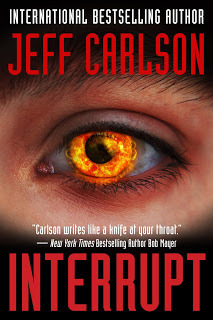
This Author Spotlightfeatures
Jeff Carlson
author of
Interrupt
 Jeff Carlson is the international bestselling author of Interrupt, Plague Year, and The Frozen Sky. To date, his writing has been translated into sixteen languages worldwide.
Jeff Carlson is the international bestselling author of Interrupt, Plague Year, and The Frozen Sky. To date, his writing has been translated into sixteen languages worldwide.I had the pleasure of reading The Frozen Sky, about an international team of scientists who discovers something incredible on Io.
I'm pleased to welcome Jeff this week to discuss his latest novel Interrupt.
1. How did you get into writing and why do you write?
My father and my grandfather on my mother’s side were both heavy readers and especially interested in science fiction. In fact, my grandfather’s library included autographed copies of Isaac Asimov’s Foundation trilogy.
That means I grew up reading high concept, mind-croggling writers like Heinlein, Niven & Pournelle, Haldeman, Varley, you name it. As I grew older, I also discovered more literary blockbusters such as Michener and Auel, then more commercial madmen like King and Koontz.
Eventually I wanted to play, too. I wrote my first novel when I was thirteen. It was bad -- I mean it was atrocious -- but I enjoyed the work.
For me, writing is like playing an extremely good game of chess except to say that I’m not only the good guys and the bad guys, I’m also the chess board. Building worlds is involving and exciting and fun.
2. What do you like best and least about writing?
The best is when the words are flowing well or when a new revelation strikes. (“My God!” Jeff shouts to himself in his office. “What if she was actually the villian!?!”)
The worst is the waiting. The wheels in writing and publishing turn at glaaaaaaacial speeds. You can get old fast in this business, which means it’s always a pleasure to near the end of a project or to finally reach the book’s release day.
The main thing is to enjoy the process itself. Writers are crazy. The job description is sitting alone in a room listening to the voices in your head. It demands patience and persistence.
3. What is your writing process, i.e., do you outline? Do you stick to a daily word or page count, write 7 days a week, etc?
Keeping in mind that I’m a family man and we’re not exactly in the tax bracket where we employ maids, gardeners, cooks, and chauffers, I write 5 days a week for as many hours as possible. I’m also juggling all of those other jobs. We’re really, really busy. So my personal goal is six pages a day. Occasionally I achieve more. Often I achieve less. No question there are many writers who are more prolific, but I’m also engaged in real life outside my office.
As for outlining, I usually have several high points or scenes in mind for any given project. I move the story toward those high points, but I hate to outline because part of my motivation is finding out what happens next. If I’ve already worked out every little detail, then I’m just connecting the dots. It lessens my excitement.
4. Who are some other writers you read and admire, regardless of whether they are commercially “successful?”
Joel Shepherd writes killer high tech sf. Robert Crais and Nelson DeMille rank among my favorite suspense writers. It won’t surprise anyone that I also enjoy James Rollins and Preston & Child thrillers. Those guys are nuts!
5. Should the question mark in the previous question be inside or outside the quotes?
Outside, you fool. HA!
6. What’s your stance on the Oxford Comma?
I’ve reluctantly grown to love it as should every writer, reader, and editor…
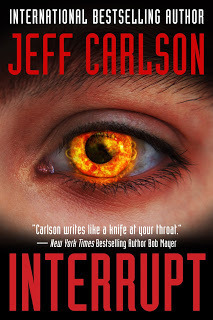 7. What is Interrupt about and how did it come to fruition?
7. What is Interrupt about and how did it come to fruition?The book is loosely based on a short story I wrote in 2002. Of course the short story was compact. It had loose threads galore. I just needed more parts of the puzzle, and I’m one of those guys who squirrels away interesting articles wherever I find ‘em, magazines, newspapers, web sites. Years later, the rest of the puzzle fell into place for me. Then I sat down and worked through it. Eventually I realized I had an epic disaster novel on my hands.
Here’s the back jacket copy:
“Riveting.” —Scott Sigler
“Edgy and exciting.” —Bob Mayer
In the distant past, the leader of a Neanderthal tribe
confronts the end of his kind. Today, a computational biologist,
a Navy pilot, and an autistic boy are drawn together by the
ancient mystery that gave rise to Homo sapiens.
Planes are falling from the sky. Global communications have ceased.
America stands on the brink of war with China — but war is the least
of humankind’s concerns. As solar storms destroy Earth’s electronics
and plunge the world into another Ice Age, our civilization finds
itself overrun by a powerful new species of man…
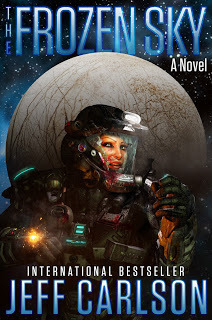 8. What’s your current writing project?
8. What’s your current writing project? A sequel to The Frozen Sky.
9. What book(s) are you currently reading?
Gideon’s Corpse by Preston & Child, Half Way Home by Hugh Howey, plus an awesomely subversive nonfiction book called Everything Bad Is Good For You by Steven Johnson.
10. Who or what inspires your writing?
People ask me where I get my crazy ideas, to which I can only reply, “Everywhere.” Imagine what your great-grandparents would think if they found themselves walking down the street with handheld gadgets that allow them to connect instantly with anyone on the planet. We’re surrounded by real miracles in nanotech, robotics, deep-space astronomy, medicine, weapons technology. This morning’s news reads like a Philip K. Dick novel.
We live in an interesting world! That makes it an especially good time to be a writer.
Finally, is there anything you’d care to add? Please also include where people can read your published stories, buy your book, etc.
Books are available wherever books are sold, including at the links below.
Interrupt Plague Year The Frozen Sky
Published on August 15, 2013 13:01
August 7, 2013
10 Questions with Writer Shane Peacock (@Shane_Author)
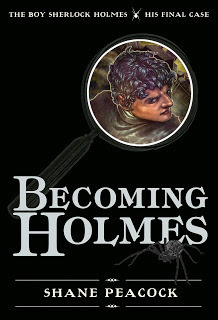
This Author Spotlightfeatures
Shane Peacock
author of Becoming Holmes: The Boy Sherlock Holmes, His Final Case
I'm pleased to welcome a talented and internationally-acclaimed writer for this week's interview: Shane Peacock.
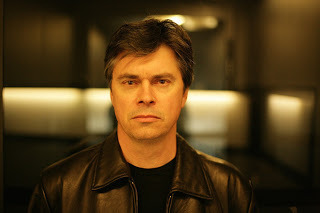 Shane Peacock is a novelist, playwright, journalist, and television screenwriter. His first book was a biography of the spectacular Canadian personality, “The Great Farini,”; his plays have been produced by the acclaimed 4th Line Theatre; his documentaries have included “Team Spirit,” aired on the CTV national network, and among his novels is “Last Message,” a contribution to the groundbreaking “Seven” series for young readers. His best-selling series for Young Adults, “The Boy Sherlock Holmes,” has been published in ten countries in twelve languages and has found its way onto more than fifty shortlists. It won the prestigious Violet Downey Award, The Arthur Ellis Award for crime fiction, the Ruth & Sylvia Schwartz Award, and The Libris Award, has three times been nominated for the TD Canadian Children’s Literature Award, and each novel in the series was named a Junior Library Guild of America Premier Selection.
Shane Peacock is a novelist, playwright, journalist, and television screenwriter. His first book was a biography of the spectacular Canadian personality, “The Great Farini,”; his plays have been produced by the acclaimed 4th Line Theatre; his documentaries have included “Team Spirit,” aired on the CTV national network, and among his novels is “Last Message,” a contribution to the groundbreaking “Seven” series for young readers. His best-selling series for Young Adults, “The Boy Sherlock Holmes,” has been published in ten countries in twelve languages and has found its way onto more than fifty shortlists. It won the prestigious Violet Downey Award, The Arthur Ellis Award for crime fiction, the Ruth & Sylvia Schwartz Award, and The Libris Award, has three times been nominated for the TD Canadian Children’s Literature Award, and each novel in the series was named a Junior Library Guild of America Premier Selection. 1.How did you get into writing and why do you write?
I often tell audiences that I became a writer because I didn’t want to have a job. I’m mostly kidding when I say that, of course, since I’ve learned over the years that writing is a very hard job, but in some ways I am telling the truth. Writing isn’t a job like a lawyer’s or a teacher’s or most any other. What writers do, or at least what I try to do when I write, is to tell the truth about life as I see it. I live my life, explore life in general, and then create stories that address what I think that life is all about. Also, when I was young I was desperate to have my say. Maybe it was the middle child thing! Writing gives me a voice.
2.What do you like best (or least) about writing?
I like the period when I am being the most creative, which is usually when an idea is coming to me and I am beginning to develop it in my head. You can feel the characters coming alive, the story evolving, the subtext saying something, and when it is working, all of those things are coming together and it all feels kind of magical.
3.What is your writing process? IE do you outline? Do you stick to a daily word or page count, write 7 days a week, etc?
My writing process has changed over the years. I used to simply start with what I felt was an exciting and meaningful idea and begin to write. I’d let the story work itself out as I wrote it, only sticking to the story’s meaning and the basic plot line. I seldom knew what was going to happen at the end. Then, a few books into my career, I was offered a very nice four-book contract. But the publisher needed to know a great deal about each novel before they signed off. So, I developed each story fairly thoroughly and went from there. That seemed to work even better than my earlier, less structured approach. Now, I use a hybrid. I like to develop my novels in some detail ahead of time but always leave myself open to sharp turns and twists, sudden changes in the story’s plan. I believe that if your story is too pre-meditated, your reader will sense that. I often say to young writers that the most important person to surprise in a novel is not the reader, but yourself. So, make your characters and your story come alive and see where it takes you, within the general plan of your novel.
I write pretty well every day of the week, the month and the year! I don’t usually have a word or page count, but when a deadline is looming, I sometimes have to force myself onto a strict schedule of daily accomplishment.
4.Who are some other writers you read and admire, regardless of whether they are commercially “successful?”
I tend to like the biggies, the really biggies. My favorite writers, without question, are Dickens and Shakespeare. You just can’t beat them. Melville also had a great influence on me in school, as did Faulkner, though over the years, I’ve had some more unusual favorites, like Nathaniel West. Yes, I like the old guys! In terms of slightly more current authors, I’m a big John Irving fan, must be the Dickens in me!
5.Should the question mark in the above question be inside or outside the quotes?
I’m an inside guy on that one.
6.What’s your stance on the Oxford Comma?
I’m for it! I’m for all sorts of, commas, everywhere! I use them with reckless abandon. It’s probably the control freak in me. I love to read out loud, from both my work and others. I like to create the right rhythm in my work and find the proper one in others. I re-read my work constantly as I’m writing it, re-reading great sections every day before I begin, building up to the moment when I start in again. It just HAS to sound right, and commas help to get you there.
7.What is your book about and how did it come to fruition?
My latest novel is the last one in the Becoming Holmes: The Boy Sherlock Holmes, His Final Case . The thing about writing about Holmes as a youth is that everyone knows what happens to him – he grows up to be the legendary detective. So, everyone knows what happens! And so, I had to create some real surprises in my final Boy Sherlock book. I think I accomplished that. The moment when the villain is identified, for example, is pretty shocking. This last book is pretty dark, but I think that’s fitting since Sherlock Holmes is a rather dark character and I didn’t want to make him shallow or a caricature in any way. I wanted him to be THE guy, very real and gritty, working his magic in the dark world of Victorian London.
8.What’s your current writing project?
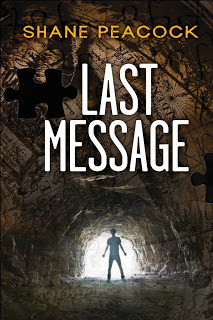 I have two. One is the sequel to “Last Message,” which was my contribution to the groundbreaking “Seven, the Series,” from Orca Books. This series is a group of seven novels written by seven different, acclaimed authors, all dealing with a grandfather who, in his will, asked his seven grandsons to complete his bucket list, sending them off on seven daring adventures. My sequel has a kind of James Bond feel to it. That novel will be out in the fall of 2014.
I have two. One is the sequel to “Last Message,” which was my contribution to the groundbreaking “Seven, the Series,” from Orca Books. This series is a group of seven novels written by seven different, acclaimed authors, all dealing with a grandfather who, in his will, asked his seven grandsons to complete his bucket list, sending them off on seven daring adventures. My sequel has a kind of James Bond feel to it. That novel will be out in the fall of 2014.My other project is the first in a trilogy for Tundra Books … and I can’t say too much about it, other than that it is set in very late Victorian England and the bleak moors of Scotland, and has a sort of horror story feel to it, a kind of Wilkie Collins, Edgar Allan Poe, Mary Shelley, Bram Stoker kind of thing to it! Wow, sounds good!
9.What book(s) are you currently reading?
I am on an Edgar Allan Poe kick and I’m just finishing reading his biography and entire oeuvre. Amazing stuff! What an incredible imagination, perhaps unmatched. I can’t believe, re-reading these works, how much Conan Doyle stole from him in his creation of Sherlock Holmes. Poe wasn’t just a horror story writer either – he was a great poet and one of the first and most important literary critics in history. Few writers have been so accomplished in all three categories of prose, poetry and criticism. And, man, what a spooky death, awfully fitting, I must say.
10.Who or what inspires your writing?
My father used to tell me frequent bedtime stories and I only now realize how they lit me up. I learned to absolutely love stories. That’s at the core of my love of writing. Stories. We all love stories, every last one of us. If you are a human being, you love them. I think, also, we all want our lives to be stories, to have narrative, and we transfer that into our fascination with the stories of others’ lives, real or fictional. I also believe fervently in the importance of the imagination. It is what powers life.
Finally, is there anything you’d care to add? Please also include where people can read your published stories, buy your book, etc.
First of all, thanks for featuring me. Much appreciated.
People should be able to buy my novels at any reputable bookstore in North America, and in many other countries around the world, since the Boy Sherlock Holmes series is published in 12 languages in 10 countries and counting. They can also be ordered online just about everywhere on Amazon, and in Canada, where I live, on Chapters.ca
Look for the new series from Tundra next year, and the sequel to my novel in “Seven, The Series.”
You can check out my work and activities at my website at: www.shanepeacock.ca
I’m on Facebook too, and Twitter at Shane Peacock @Shane_Author
Thanks, Shane. Great to see your books are being enjoyed by people around the world. Best of luck on the two new projects.
Be sure to grab a copy of Becoming Holmes: The Boy Sherlock Holmes, His Final Case, check out Shane's website, and follow him on Twitter to stay up to date with his writing. And grab a copy of his book via the link below!
Published on August 07, 2013 13:42
August 2, 2013
10 Questions with Novelist Pete Abela (@PeteAbela)
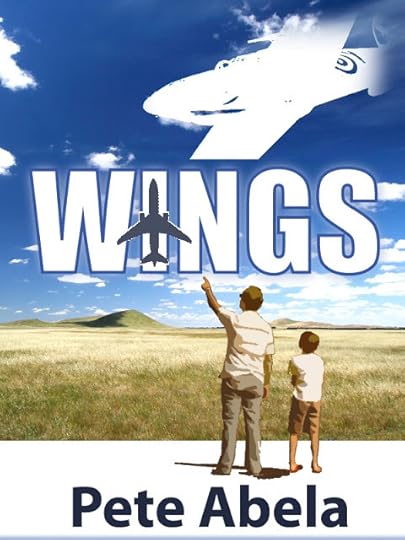
This Author Spotlight features novelist Pete Abela, author of WINGS (see above).
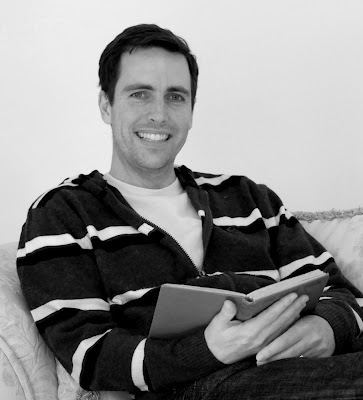
Pete is an author from the city of Wollongong, just south of Sydney in the state of New South Wales, Australia.
For most of his adult life, Pete has been a left-brained computer scientist whose love of reading eventually led him to take up writing. Having surprised himself and those around him by getting Wings published, he’s now having fun dreaming up marketing strategies and publicity stunts – tasks he never could have envisaged doing ten years ago. He continues to stretch the boundaries of his right hemisphere and is now working to complete a second novel.
His left brain hasn’t been totally neglected through this process. Pete works as an IT Manager in order to help keep his wife and four kids fed and clothed. When he’s not working, reading, writing or enjoying the company of his family, Pete likes to sneak away for a bit of exercise – either tennis, soccer or a laborious run.
1. How did you get into writing?
My writing journey began when I commenced a journal around ten years ago. I found it a useful and therapeutic practice which helped me make sense of day to day life and get a sense of perspective. I found it amazing when I read over my journal to see the things I’d been worried about six months ago. In most instances these “problems” had simply vanished.
I found that I enjoyed the process of writing, so I progressed from journaling to an autobiographical account of my late teens and early twenties. It hasn’t been published, and it’s unlikely that it ever will be.
When I finished that, I started thinking about what else I could write. Wings is the result.
2. What do you like best (or least) about writing?
The best thing about writing is when I get in the zone … when I don’t have to consciously think and the words just flow out.
The thing I like least is that I get in the zone so rarely. I think the last time it happened was 21st October, 2010. In between times there’s a lot of persistence required in order to churn out a decent work.
3. What is your writing process? IE do you outline? Do you stick to a daily word or page count, write 7 days a week, etc?
I’m now working on my 2nd and 3rd novels and each of the three has proceeded in the same way. They start with a burst of unconstrained energy where I just sit down and write. This continues until I get stuck (usually at around the 10,000 word mark). At this point I need to plan out the rest of the novel, scene by scene. Once the plan has been completed, I resume my writing and finish it off. Some part of the first 10,000 words is usually throwaway, and often it gets transformed in some way. However, I don’t regret it, because it is during those first 10,000 words - when I am flying by the seat of my pants – that I work out what the novel will be about.
When I have the plan worked out, I aim to complete around 700 words a day, six days a week.
I use Scrivener to help me organise and re-organise my work.
4. Who are some other writers you read and admire, regardless of whether they are commercially “successful?”
It’s hard to come up with a short list, but my physical book shelf is full of (in alphabetical order) Jeffrey Archer, Desmond Bagley, Bernard Cornwell, Michael Crichton, Dick Francis, John Grisham, Arthur Hailey, Louis L’Amour, Alistair McLean, JRR Tolkein and Jules Verne to name but a few. It’s a very full shelf.
I’ve recently acquired a kindle and am looking forward to venturing into new areas including Dickens and great new Indie authors.
5. Should the question mark in the above question be inside or outside the quotes?
I think it’s a moot point, because I wouldn’t have put quotation marks around the word successful.
6. What’s your stance on the Oxford Comma?
I don’t know if I should admit this, but I hadn’t heard the term ‘Oxford Comma’ before you asked me this question. Google and Wikipedia have come to my aid and I can now answer the question.
I do not use the Oxford Comma unless it is required to resolve an ambiguity.
7. What is your book WINGS about and how did it come to fruition?
WINGS tells the story of Walt and his grandson Scott, who both have a fierce longing to fly albeit in vastly different circumstances. Walt - who grew up in the depression - found out first hand that becoming a pilot takes sacrifice and tenacity. When World War II broke out he pestered the RAF for eighteen months before they finally accepted him.
Scott spent his childhood listening to tales of his Grandfather's aerial exploits and developed an intense craving to be a pilot. However, the number of people wanting to be a pilot vastly outweighs the limited opportunities on offer.
WINGS weaves together two tales: one set in war-torn northern England, and the other set in the modern-day Illawarra region of New South Wales. As Scott progresses, his grandfather declines – Walt loses his wife, his sight and his hearing – but throughout these difficulties is still there to offer support and encouragement. With insights into the modern aviation scene and life in the Royal Air Force of World War II, this is a must for anyone who has an interest in history, aviation or simply an old fashioned love story.
Although Wings is a novel, I did draw inspiration from two men I greatly admire. The first is my grandfather who was a fighter pilot during World War II; the other is my younger brother who is a commercial pilot with a major Australian airline.
I consider them both to have lived through fascinating, unusual and difficult circumstances and I thought I could use their experiences as the basis for this novel.
8. What’s your current writing project?
I’ve just finished the first draft of Just Cause, a novel about a new Dad who has to deal with the loss of his job and a life-threatening illness experienced by his infant son. I’m currently editing and polishing this.
I’m also about a third of the way through Lessons from a Two-year Old. It is about a thirty-year-old IT geek who lives at home with his parents. He gets roped into babysitting his two-year-old niece once a week. She's a pain and a challenge for him, but over time he watches her and learns lessons about independence, interacting with people and enjoyment of life generally which help him turn his life around (move away from home, change his work, try relationships, get fit, etc). He'll have a few misadventures along the way, but it should finish with a happy ending.
9. What book(s) are you currently reading?
Julian by Gore Vidal. It’s a diary of the fourth century Roman leader and is engaging from the point of view of the story and fascinating from a historical perspective.
One of the next books I’m planning on reading is the GO-KIDS series. I’ve been told it's aviation-themed, albeit in the near future; kind of a HARRY POTTER meets TOP GUN a la IRONMAN with a dash of THIS PRESENT DARKNESS sprinkled throughout.
10. Who or what inspires your writing?
The challenges we face on a day to day basis are many and varied. In trying to construct a meaningful life, we need to juggle love and career, family responsibilities and individual aspirations, joy and tragedy.
I write books grounded in reality which highlight some of these challenges and dilemmas and explore how people tackle them in different situations.
Finally, is there anything you’d care to add? Please also include where people can read your published stories, buy your book, etc.
The first chapter of WINGS can be downloaded from my website at http://peteabela.com/books. This page also has links to purchase it from the publisher ((http://www.reallybluebooks.com) and Amazon.
Your readers may also be interested in reading my blog, ‘Spread Your Wings’ at http://blog.peteabela.com which contains articles about some of the topics I’m most interested in including reading, writing, and techniques for setting goals and achieving them. You can find more about me at my website and blog (http://peteabela.com). The blog contains a number of really bad jokes. You have been warned.
Contacting Pete:http://www.facebook.com/PeteAbela Twitter: @PeteAbelaWebsite: http://www.peteabela.com Blog: http://blog.peteabela.com
Published on August 02, 2013 05:33
July 30, 2013
10 Questions with Writer Michael McCarty (@michaelmccarty6)

This Author Spotlightfeatures
Michael McCarty
Author of Rusty the Robot's Holiday Adventures and more than30 other books!
 Michael McCarty has been a professional writer since 1983 and is the author of over thirty books of fiction and nonfiction including I Kissed A Ghoul, Modern Mythmakers, Masters of Imagination, Revenge of the Two-Headed Poetry Monster (co-written with Mark McLaughlin) and many others.
Michael McCarty has been a professional writer since 1983 and is the author of over thirty books of fiction and nonfiction including I Kissed A Ghoul, Modern Mythmakers, Masters of Imagination, Revenge of the Two-Headed Poetry Monster (co-written with Mark McLaughlin) and many others.He is a five-time Bram Stoker Finalist and in 2008 David R. Collins’ Literary Achievement Award from the Midwest Writing Center. He lives in Rock Island, Illinois with his wife Cindy and pet rabbit Latte.
 1.How did you get into writing and why do you write?
1.How did you get into writing and why do you write?I’ve been writing for a long time. My first published article was of an interview with a teacher for the school newspaper and that was in grade school. Ten years later, my first paid article was a record review of a Pink Floyd album. Ten years after that, I had my first national publication, an interview with Frederik Pohl for Starlog Magazine. In 2003, my first book came out, Giants of The Genre from Wildside Press. I haven’t stopped since.
2.What do you like best (or least) about writing?
What I like best about writing; that it’s like magic. You take nothing and create something. Abracadabra, Hocus Pocus, Alakazam! Boom, you have a book. I like doing book signings a lot too, because I get to meet the fans, which is always fun.
What I like least is editing, it is like operating on yourself without using any anesthesia. Promotion is a necessary evil, like voting. (Laughs).
3.What is your writing process? IE do you outline? Do you stick to a daily word or page count, write 7 days a week, etc?
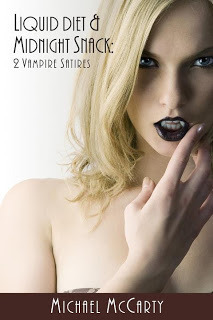 I didn’t start out using an outline for my first book Liquid Diet & Midnight Snack: 2 Vampire Satires but I ended up zigging and zagging all over the place for about a decade.
I didn’t start out using an outline for my first book Liquid Diet & Midnight Snack: 2 Vampire Satires but I ended up zigging and zagging all over the place for about a decade.I decided to try a 20-page outline for Monster Behind The Wheel;my collaborator Mark McLaughlin and I took 5 years to write that novel. Since then, I haven’t used an outline because, if I don’t know what is going to happen, neither will my readers. My plots are by the seat-of-my-pants; I guess if I give up wearing pants I won’t be able to write anymore (laughs).
Ten years ago, I tried to stick to a four-page-a-day quota. But after 30 books, I write when I’m inspired, after that many books, you get that luxury.
4.Who are some other writers you read and admire, regardless of whether they are commercially “successful?”
Most of the writers I like best, I have interviewed in my interview books such as Giants of the Genre, More Giants of the Genre, Masters of Imagination, Mythmakers and Esoteria-Land. That is over 150 people including: Ray Bradbury, Dean Koontz, John Saul, Bentley Little, Peter Straub, Joe McKinney, Richard Matheson, Whitley Streiber --- you get the idea.
5.Should the question mark in the above question be inside or outside the quotes?
In the United States, periods and commas go inside quotation marks. The British do it the other way around.
6.What’s your stance on the Oxford Comma?
The 'Oxford comma' is an optional comma before the word 'and' at the end of a list. As an English Major and Journalism Major in college, this stuff was shoved down my throat, like a worm to a baby birdie. Now that I am graduated and the author of over thirty books, I say, who gives a bloody hell about the Oxford comma (laughs).
 7.What is your book Rusty the Robot’s Holiday Adventuresabout and how did it come to fruition?
7.What is your book Rusty the Robot’s Holiday Adventuresabout and how did it come to fruition?Rusty the Robot’s Holiday Adventures by Sherry Decker and Michael McCarty was recently published by Pie Plate Publishing. This is my first kid’s book and I had more fun than Kim Kardashian at a pie-eating contest.
8.What’s your current writing project?
I’m doing another short story collection for Damnation Books called Laughing In The Dark; it should be out early 2014. This is going to be my sixth short story collection. These are all kooky and spooky twisted tales, I think my fans will really enjoy it. William F. Nolan, the author of Logan’s Run wrote the introduction and Bram Stoker and World Fantasy Winner P.D. Cacek wrote the afterword.
9.What book(s) are you currently reading?
Zombies Don’t Cry by Rusty Fischer, Paranormal Properties by Tracy Lane, The Adulterer's Unofficial Guide To Family Vacations by Leslie Langtry and Forever In Vein by Jody R. LaGreca.
 10.Who or what inspires your writing?
10.Who or what inspires your writing?Dreams, nightmares and my zany life and friends.
Finally, is there anything you’d care to add? Please also include where people can read your published stories, buy your book, etc.
Thank you for taking the time to interview me. And thank you to all my fans for supporting me for all these years. Please check out my books. Here are some of my latest and links to them. These are available as trade paperback and kindles. (If you want them in Nook, check out Barnes & Noble.)
Rusty the Robot’s Holiday Adventures by Sherry Decker andMichael McCarty:
Revenge of the Two-Headed Poetry Monster by Michael McCarty& Mark McLaughlin
Night of the Scream Queen by Michael McCarty and LinneaQuigley.
Return of the Scream Queen by Michael McCarty, LinneaQuigley and Stan Swanson.
Bloodless by Michael McCarty and Jody R. LaGreca
Bloodlust by Jody R. LaGreca and Michael McCarty
Lost Girl of the Lake by Joe McKinney and Michael McCarty
Conversations with Kreskin by The Amazing Kreskin and Michael McCarty
Monster Behind The Wheel by Michael McCarty and Mark McLaughlin
I Kissed A Ghoul by Michael McCarty
Thanks, Mike, for sharing your many works. Best of luck with Rusty the Robot and keep us posted on your future works.
Michael McCarty is on Twitter as @michaelmccarty6. Facebook! Like him on his official page: http://www.facebook.com/michaelmccarty.horror. Or snail mail him at:
Michael McCarty
Letters
P.O. Box 4441
Rock Island, IL
61204-4441
Published on July 30, 2013 14:25
July 25, 2013
10 Questions with Novelist & Screenwriter Andrew John Rainnie (@andrewrainnie)

This Author Spotlightfeatures
Andrew John Rainnie
Novelist, Screenwriter, and Author of
My Right Leg Is TastierThan My Left
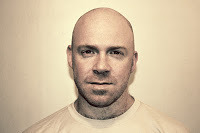 Andrew John Rainnie is a Scottish novelist, screenwriter and journalist.
Andrew John Rainnie is a Scottish novelist, screenwriter and journalist.He has an MA in English Literature and Film & TV Studies, and a Postgraduate degree in Screenwriting.
He currently lives in Glasgow, working as a freelance script developer and copywriter, and has recently started his own film and multimedia production company, Rain Fire Films.
When not indulging his addiction for video games, he can be found taking photos for his website Discover Glasgow, a guide to Scotland's biggest city for locals and tourists alike.
1.How did you get into writing and why do you write?
I’ve been writing since I was old enough to hold a pencil. It wasn’t so much the writing as the storytelling that appealed to me. I’ve always been heavily influenced by films and television, but I found that the best way I can craft a story is through my writing, which is why I studied screenwriting.
However, there is an appeal to writing a book in that it is your voice, whole and complete, whereas films and television shows are a large collaborative effort, despite what auteur theory says.
2.What do you like best (or least) about writing?
Finding the time. I’ve been an insomniac since I was a teenager, and my mind is always active in the twilight hours, which is when I usually sit and just hammer away at the keyboard or scribble words down on paper. But I have an imagination that refuses to turn off, so I’ll constantly be thinking of the story during the day, the cogs working in the background, finding stronger bonds between characters or better scenarios to fit the theme of the story I wish to tell. But time always seems to escape me. Although I read a quote recently that made me laugh. “Time is an illusion. Only clocks are real.”
3.What is your writing process? IE do you outline? Do you stick to a daily word or page count, write 7 days a week, etc?
It largely depends what format I am writing, or even by project. For filmmaking I write a two-page synopsis, and then expand it to 10-12 pages before writing the first draft. But then halfway through writing an idea may crop up that throws a spanner into the works, but I think it is best to grasp those creative sparks and run with them rather than stick with the rigid structure. Trying to do both is the key. Likewise for books, I started a fantasy trilogy, “The Spirits of Vengeance,” and realized I would have to plot the three parts. As I was writing the first book, the structure of the next two books was constantly being revised as the series evolved.
For “My Right Leg Is Tastier Than My Left” there was no structure, it was a blog I kept while travelling around the world. When I came to collect it in one volume, I did try and put a bit of structure to it. In fact I found that on some subconscious level I already had, many of the people I met and themes I explored ran like a thread through the book. I think it was the scriptwriter in me ingrained in my thoughts.
4.Who are some other writers you read and admire, regardless of whether they are commercially “successful?”
Terry Pratchett is one of my main inspirations for writing. He seems to manage his wry sense of humour effortlessly. I really enjoyed Marcus Zusak’s novels, and I’m looking forward to seeing “The Book Thief” adapted into a film. Jonathan Lethem is one of my favourite modern writers. A friend of mine got me hooked by giving me “As She Climbed Across The Table,” as a gift. I remember naively trying to get a job adapting the script for DreamWorks. I ended up adapting a short story by Lethem, “The Collector,” and directing the short film.
I also admire Joss Whedon as a screenwriter who often manages to elicit the humour in even the most serious situations, but brings a sense of poignancy to his pieces. I think it’s a great thing that he now gets recognized as a great director too, but I think that is an extension of his writing, and his overall voice. The same is true with Quentin Tarantino; his scripts are his outright, and his dialogue is so cutting. Many screenwriters are hard to judge because a great screenplay can make a terrible film, and a lot of films these days are rewritten several times, and it often seems like “too many cooks.” There hasn’t been a truly great film where there was six screenwriters!
I think a lot of writing has lost the suspense it once had, especially in television. I remember the likes of J.J. Abrams’ “Alias” often ended with a cliffhanger, but you don’t really get that now, except in comics. Jonathan Hickman and Brian Michael Bendis are very good at bringing those “WTF?” moments to the last page of a comic.
5.Should the question mark in the above question be inside or outside the quotes?
Inside.
6.What’s your stance on the Oxford Comma?
I write for an American gaming website, Warpzoned.com, and my editors are always busting my chops for forgetting the elusive Oxford comma. It doesn’t come natural to me. I guess I don’t think it is necessary to have punctuation there.
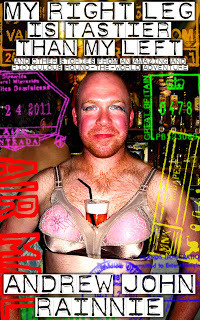 7.What is your book “My Right Leg Is Tastier Than My Left” about and how did it come to fruition?
7.What is your book “My Right Leg Is Tastier Than My Left” about and how did it come to fruition?There is a story behind the story. Essentially I was a Scottish guy who had been living in London for five years, working as a media analyst and freelancing as a script developer. When the current Conservative-Liberal Democrats coalition government came into power, the first thing they did was disband the UK Film Council, which meant I lost some of my freelance work. I had also just turned 29, and finished making a short film, “The Collector,” based on a short story by Jonathan Lethem. My creativity was fried and the mood in Great Britain was miserable, largely thanks to the bankers getting bailouts while the rest of us went poor. I’ve always wanted to travel the world, being an Indiana Jones fan, and all the things in my life just made me want to escape into the wild. So I did. I took a year off and just went travelling. I remember a few months in staying at the Indy Guesthouse in Busan, South Korea. The owner, Indy, has a large Raiders of the Lost Ark poster with his face photoshopped over Harrison Ford’s. When I saw that I knew I had made the right decision.
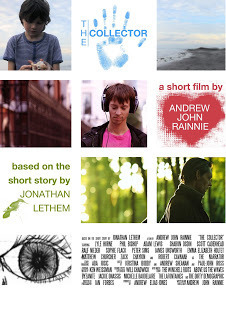
8.What’s your current writing project?
I have just finished a feature film script, “The Unseen,” for a director I know in London, so I’m waiting on his notes before I redraft that. I’m also rewriting the first book in my “Spirits of Vengeance” trilogy, “The Stone of Spirits.” I’m hoping to find a publisher for that soon, or self-publish again.
I am also putting together three short film scripts to be filmed by myself back-to-back, entitled “The Illuminant Midnight Project.” Each film deals with the themes of life and death in their own way, and I’m hoping to launch a Kickstarter campaign for that later this year.
9.What book(s) are you currently reading?
“Shantaram” by Gregory David Roberts. I picked it up when I was travelling but never found the time to read it.
10.Who or what inspires your writing?
Everything. I read a lot, watch ridiculous amounts of films and television. I spend afternoons people watching, just picking out traits, flaws, characteristics. I digest a lot of information, from photographs online to tales people have told me. Music inspires me a lot; my early stories and films were often named after the songs that had conjured them into my brain. I’ve been slowly piecing together a post-modern novella that is a book about where we get our inspiration. I have a file that I add snippets of inspiration to. When it has enough weight I’m going to chip away at the raw information and carve a story out of it, but that is years away.
Finally, is there anything you’d care to add? Please also include where people can read your published stories, buy your book, etc.
“My Right Leg Is Tastier Than My Left” is available from Amazon US and Amazon UK, Apple iTunes, Google Play, Barnes & Noble, Sony eBookstore and Smashwords.
I have just started my own film company, Rain Fire Films, through which I’m hoping to make more short films and music videos.
Thanks, Andrew. Great interview. I greatly enjoyed As She Crawled Across the Table. Highly recommended.
Be sure to check out Andrew's Rain Fire Films, follow him on Twitter, and grab a copy of his book!
“My Right Leg Is Tastier Than My Left” is available from Amazon US and Amazon UK, Apple iTunes, Google Play, Barnes & Noble, Sony eBookstore and Smashwords.
Published on July 25, 2013 02:22
July 20, 2013
EYE CANDY: SciFi Tour de Force + $0.99 = Hours of FUN!

EYE CANDY
On Salefor aLimited Time
$0.99
Hi, guys.
Just a quick and dirty announcement to let everyone know that I've got EYE CANDY on sale for a paltry, laughable, yet all-powerful $0.99.
Hours and hours of literary entertainment await you.
Tell everyone you know.
Tell the checker at the grocery store.
Tell the poor bastard sweatin' their ass off in the toll booth on your way home from work across the bridge.
Tell your vet while he/she has his/her finger up your dog's butt.
Tell the cop writing your citation after you got nailed for doing 65 in a 35 because you wanted to get home so you could get back to reading EYE CANDY.
And of course the paperback version is also available at regular price, because I don't yet own a conglomerate of logging, printing, and shipping companies. But the printed-and-bound edition does make for quite a conversation piece. The eyegasmic cover art alone is worth having on your coffee table or next to your laptop and venti mocha frapp at Starbucks or in your hot little hands while exploring ComicCon this week.
Select your preferred link:
AMAZON - ow.ly/na2Ej
B&N NOOK - ow.ly/na2I3
iTUNES - ow.ly/na2OX
SMASHWORDS - ow.ly/na2V9
KOBO - ow.ly/na3tb
SONY - ow.ly/na2R3
And as always, a heartfelt thanks for everything. We write for ourselves, first and foremost. But we also write to be read. Here's to happy reading!
Published on July 20, 2013 17:28
July 16, 2013
10 Follow-Up Questions with Writer Michael Gunter (@Michael_Gunter)

This Author Spotlightfeatures an exciting follow-upinterview withwriter
Michael Gunter
author of Blackwell and Defying Gravity
 At the age of ten, Michael saw his first episode of The Twilight Zone and got hooked on mystery. At eighteen, he had an encounter with Jesus Christ that changed the course of his life.
At the age of ten, Michael saw his first episode of The Twilight Zone and got hooked on mystery. At eighteen, he had an encounter with Jesus Christ that changed the course of his life.In 2001, he discovered his passion for writing. Today, he writes about the mysteries of life from a biblical Christian perspective; sometimes in straight up nonfiction and sometimes in the garb of fiction. His aim is to write great books that entertain and provoke meaningful contemplation and conversation. When Michael is not writing, he enjoys spending time with his wife and kids, playing guitar, and refilling his favorite coffee cup.
 I spoke with Michael in September 2012 after the release of his debut novel
Blackwell
. (You can read that interview HERE.)
I spoke with Michael in September 2012 after the release of his debut novel
Blackwell
. (You can read that interview HERE.)Now I'm excited to help him spread the word for the release of his newest novel Defying Gravity , the follow-up novel to Blackwell .
This is a follow-up interview, but for people who are not already familiar with your work, tell us what kind of books you write and what readers should expect from your stories, and what is your latest novel, Defying Gravity, about?I like to think of my stories as realistic science-fiction. They contain elements of the mysterious, like time-travel and extraterrestrials, but they are believable. I do a lot of research about places and technologies and theories. I even look up weather conditions and moon phases to make sure the setting of my story reflects the conditions of real time and space. I want my readers, at some point in the story, to become aware of the thought forming in their own minds that this could actually happen. Whether they admit that is completely up to them. As for my latest novel, Defying Gravity is set in the near future of 2016. It’s about two extraterrestrials who became stranded on Earth when their ship narrowly escaped capture back in 2001. Aldi, the father, longs for his wife, and his daughter, Sara, dreams of the mother she has never known. When their ship returns, it triggers a chain of events that threaten the happy family reunion. The United States military reacts to what it believes is an alien invasion. An otherworldly being with an ancient score to settle sees it as an opportunity to turn the tide in a cosmic battle. And a young man learns that the girl of his dreams isn’t exactly what she seems. There’s a lot of action in this one, and even some human/extraterrestrial attraction.
What was the duration of the writing process for Defying Gravity?It took me about fourteen months to write the manuscript. Then it took another six months to get it ready for publication.
When Defying Gravity is adapted to film, and the producers ask for your dream cast, what will you say?
 Once I start breathing again, I’ll probably say something like, “Hey, you guys are the experts. I’m just honored to be here.” Then I will pull from my pocket the cast list I’ve been thinking about for years.
Once I start breathing again, I’ll probably say something like, “Hey, you guys are the experts. I’m just honored to be here.” Then I will pull from my pocket the cast list I’ve been thinking about for years.Rick Blackwell…..Eric BanaJane Blackwell…..Rachel McAdamsAldi (male extraterrestrial)…..Jim CaviezelElsa-Eska (female extraterrestrial)…..Monica BellucciSara (young female extraterrestrial)….. Somebody who looks like the girl on the cover of the book.
Stephen King often makes a cameo in films adapted from his work. Stan Lee is also enjoying doing so these days. What supporting role would you like to play in the film adaptation of Defying Gravity?Well, I’d have to be made up to look much older, but I’d love to play a character by the name of Erik Jameson. He’s an old man who comes in toward the end of the story. I don’t want to give too much away. He’s just a cool old guy who gets to do something heroic and completely out of character from the “normal” life he’s lead. That’s pretty much me. I’m a normal guy who hopes to have just one shot at doing something really amazing.
For a writer, word of mouth is everything. What was the last book you read that you enjoyed so much that you wanted to share it with everyone you know?Actually, the book I am reading right now is one I’ve read twice before. It’s Time and Again by Jack Finney (Simon & Schuster, 1970). It is simply the coolest novel I’ve ever read. Time-travel, of course. It just pulls me right in every time I pick it up to read.
As of this writing, the trend in publishing is toward series novels as opposed to stand-alone books. Is Defying Gravity part of a series? If so, where do you see the story going (i.e. how many books in the series)? Yes, Defying Gravity is the second in a series called The Books of Klyv. The last time we had this conversation, we talked about the first in the series, called Blackwell | The Encounter Begins . I’m working on the final book now, but I’m seriously considering at least one more (maybe two) that will be related to the overall story, but not part of the trilogy. The first would be a prequel and the second would focus on a minor character who became much more important than I first imagined. That’s the thing, once you get into a story like this, it tends to grow. After I close the book on the whole Klyvian universe, I’d like to try my hand at time-travel…not actually traveling through time, although I would if I could, but a time-travel novel. I suspect time-travel is more difficult to write than extraterrestrial, so maybe I will be ready for it by then.
 Saul Bellow said, “You never have to change anything you got up in the middle of the night to write.” Where do ideas for your books come from, and where are you and what are you typically doing when inspiration strikes?Oh, gosh. Ideas are everywhere. We live in an ocean of ideas. I saw a guy sitting in his car at a traffic light folding and unfolding a piece of paper over and over, you know, like a nervous habit. I thought, “Wow, that’s so interesting. Why does he do that? What’s the story behind it?” And there’s a great idea for a character. I pull things from my past – experiences, people I’ve met, places I’ve been – and put them into my stories. I’m sure every writer does that. I also get my inspiration from music. Sometimes songs show up in my stories like a title or a lyric, but if you didn’t know the song, you wouldn’t catch it. I’m also big into Christian spirituality. There’s a definite spiritual message running through my stories, but it’s not always obvious. People who are familiar with the Bible will see it, but those who are not probably won’t. I don’t like preachy books, so I tend to avoid that sort of thing. Yet I am very serious about truth, although I like to come at it through the backdoor, so to speak; you know… let it sneak up on you, linger for a moment, and then go on its way. Jesus, the greatest story teller of all time, often delivered truth like that. You could say I get a lot of my inspiration from Him.
Saul Bellow said, “You never have to change anything you got up in the middle of the night to write.” Where do ideas for your books come from, and where are you and what are you typically doing when inspiration strikes?Oh, gosh. Ideas are everywhere. We live in an ocean of ideas. I saw a guy sitting in his car at a traffic light folding and unfolding a piece of paper over and over, you know, like a nervous habit. I thought, “Wow, that’s so interesting. Why does he do that? What’s the story behind it?” And there’s a great idea for a character. I pull things from my past – experiences, people I’ve met, places I’ve been – and put them into my stories. I’m sure every writer does that. I also get my inspiration from music. Sometimes songs show up in my stories like a title or a lyric, but if you didn’t know the song, you wouldn’t catch it. I’m also big into Christian spirituality. There’s a definite spiritual message running through my stories, but it’s not always obvious. People who are familiar with the Bible will see it, but those who are not probably won’t. I don’t like preachy books, so I tend to avoid that sort of thing. Yet I am very serious about truth, although I like to come at it through the backdoor, so to speak; you know… let it sneak up on you, linger for a moment, and then go on its way. Jesus, the greatest story teller of all time, often delivered truth like that. You could say I get a lot of my inspiration from Him. Brett Easton Ellis once said, “Do not write a novel for praise. Write for yourself; work out between you and your pen the things that intrigue you.” Indie publishing phenom Amanda Hocking has said that it messed with her head a bit when she realized so many people were going to read the books she’s now writing. Now that Michael Gunter is rapidly gaining recognition in the publishing world, has an established fan base anticipating his next novel, and is being talked about in the highly-reverent third person, will reader expectation influence how and/or what he writes? Or will he hold to Ellis’s suggestion?Great question. Let me ask him. (Pause) Michael Gunter totally gets Ellis. Praise from the public is like a drug. It can get you pretty high, but it can also kill you. Michael’s heart really wants to remain true to his initial reasons for writing—to gain clarity, produce a smile, and promote meaningful contemplation and conversation. On the other hand, Michael’s head has been messed with as well. For him, the fan base anticipating the next novel has created a tension. He wants to get the next installment of the story out for those who want to know what happens next, but he also wants to produce a great story, and that takes time. As for the content, there have been moments when Michael has wondered how his readers will respond to something and whether or not to include something some of them will not like. But when those moments come, he goes back to the beginning when he pondered this question: “If you knew no one would ever read a single word you write, would you still do it?” The answer is still “Yes.”
Brett Easton Ellis once said, “Do not write a novel for praise. Write for yourself; work out between you and your pen the things that intrigue you.” Indie publishing phenom Amanda Hocking has said that it messed with her head a bit when she realized so many people were going to read the books she’s now writing. Now that Michael Gunter is rapidly gaining recognition in the publishing world, has an established fan base anticipating his next novel, and is being talked about in the highly-reverent third person, will reader expectation influence how and/or what he writes? Or will he hold to Ellis’s suggestion?Great question. Let me ask him. (Pause) Michael Gunter totally gets Ellis. Praise from the public is like a drug. It can get you pretty high, but it can also kill you. Michael’s heart really wants to remain true to his initial reasons for writing—to gain clarity, produce a smile, and promote meaningful contemplation and conversation. On the other hand, Michael’s head has been messed with as well. For him, the fan base anticipating the next novel has created a tension. He wants to get the next installment of the story out for those who want to know what happens next, but he also wants to produce a great story, and that takes time. As for the content, there have been moments when Michael has wondered how his readers will respond to something and whether or not to include something some of them will not like. But when those moments come, he goes back to the beginning when he pondered this question: “If you knew no one would ever read a single word you write, would you still do it?” The answer is still “Yes.”The world of Indie authors is the new slush pile. What are you going to say/do when a traditional New York publisher and/or agent contacts you and asks for a meeting?I will buy a new shirt and a ticket on the next flight to New York. Truth is, I love Indie artists. Writers, musicians, painters, whatever—I love that spirit that says, “I’m going to practice my craft no matter how many rejection letters I get, no matter how many doors close in my face. I’ve got something to say, and I’m going to say it even if only a few listen.” At the same time, I love artists who have “made it.” I’m a bit disappointed by the whole Indie vs. Industry thing. Every big name out there was Indie at some time in their life. And I think every Indie would love to have the audience that the Industry can provide. When it gets down to it, I just love a good story no matter who wrote it. I am unapologetically an Indie author, and will be content to be one for the rest of my life. But if a big-time publisher or agent calls, I’ll go down that road…and then I’ll pull as many Indies with me who want to come along for the ride.
Someone once said, and it may have been my dad, “If you fail to plan, you plan to fail.” Where do you want your writing career to be in five years’ time? Yeah, I think I met your dad. Great guy. Five years, huh? Seriously, I’d love to have completed the Books of Klyv series and moved on to another story. But that’s for me. I’ve got two other irons in the fire that I would love to see burning white hot by then. First, my publishing coach and I are creating an online writing/publishing/promotion coaching tool that we hope will help a lot of Indie authors get their work out of the drawer and into the hands of readers. I really hope that is flourishing by then. Second, I’m in the dreaming stage with some friends about building a platform for Indie artists (mostly musicians and writers) to launch their art out to the world. Yeah, they are related and probably will cross paths at some point, but they are aiming at the same goal from two different directions. That’s what I’d like to see happen in five years.
Finally, because no artist endeavor is a solo flight, would you care to share the names and contact info for your supporting players, namely your cover designer, editor, proofreader(s), research assistant, hairdresser, dog groomer, chauffer, maid, butler, etc?Most definitely. Alane Pearce is my publishing coach and long-time friend. We’ve known each other since high school. She can be found at AlanePearce.com or email her at Alane@AlanePearce.com. Janine Krokus of J Krokus Illustrated Design is the amazing artist who created my cover. Her email address is Janine.Krokus@yahoo.com. Other members of Team Blackwell are Alyse Mosca, Tyra Wagner, John Voige, and Isaiah Brown (My book critique group), Barbara Bush (my copy editor and mother-in-law), and of course my wife, Tammi. She’s the one who has to endure the messy side of creativity that readers of the final polished product never see. If it were not for her, my books would still be in a file cabinet or kindling box.
Thank you, Michael. The new book looks great. A perfect follow-up to Blackwell .
Be sure to grab a copy of Blackwell and Defying Gravity via the links below.
Published on July 16, 2013 14:03
July 11, 2013
Fear Free Dentistry. And How to Write Gooder.

I've been experimenting with the online writing service Grammarly recently. In fact, I used Grammarly to grammar check this post because I fear free dentistry and because I want to learn to write gooder.
And it never hurts to have another set of eyes on one's work. Especially when it's an automated service, kind of like the spell checker in Word or Open Office, except more like The Terminator.
 I've also been reading
Word Up!
by Marcia Reifer Johnston (which Marcia and I discussed earlier this year HERE) and it inspired me to do a blog post on writing craft.
I've also been reading
Word Up!
by Marcia Reifer Johnston (which Marcia and I discussed earlier this year HERE) and it inspired me to do a blog post on writing craft.For example, raise your hand if you know what a compound adjective is. Also known as a phrasal adjective. Marcia discusses these critters, and the hyphens who love them, in her chapter "Hyphens Unite!" Marcia uses the following example:
"[Consider] a sign not far from my neighborhood. In large letters, it gives this command: FEAR FREE DENTISTRY. Maybe these dentists intend to scare people away from free dentistry. Probably, though, they intend to advertise fear-free dentistry. (Their omission scares me away. I don't want anyone that sloppy coming at me with a drill.)"
See how important a tiny little hyphen can be? And see how funny Marcia is? This is not another dry style guide. It's fun!
 To be blunt, most people NEED this book. I was an English Lit major and am a professional writer and even I need/use/enjoy this book.
To be blunt, most people NEED this book. I was an English Lit major and am a professional writer and even I need/use/enjoy this book.You should, too.
Marcia is looking to reach 80 Amazon reviews for Word Up! She's halfway to her goal.
Here's how to add your two or more cents:
1. Go to the Word Up! review page.
2. Click Create your own review.
Thanks for considering this request. No obligation, of course. And no expectations. Whatever you might say, she will appreciate your comments.
Now, for the results of the Grammarly check of this blog post, here's what Grammarly had to say:

23 writing issues and a score of 62 out of 100. D-minus. Appalling. It seems I must write more good.
Note that a free trial is available to play around with Grammarly. After that they offer subscriptions:

Depending upon your needs, Grammarly could prove highly effective and valuable, especially considering the cost of hiring a freelance proofreader.
 Ernest Hemingway said "Write drunk; edit sober." If Papa had had Grammarly watching his six, he might've said "Write drunk; edit sober. Wait. To hell with it; use Grammarly and edit drunk as well."
Ernest Hemingway said "Write drunk; edit sober." If Papa had had Grammarly watching his six, he might've said "Write drunk; edit sober. Wait. To hell with it; use Grammarly and edit drunk as well." Because Faulkner said "Writing consists of pen, paper, and whiskey. And Grammarly!" Okay, he didn't say that last part, but he might've.
Because Faulkner said "Writing consists of pen, paper, and whiskey. And Grammarly!" Okay, he didn't say that last part, but he might've.
Published on July 11, 2013 13:00
July 9, 2013
10 Questions with Science Fiction Writer Frank Marsh (@madchronicler97)

This Author Spotlightfeatures
Frank Marsh
author of
ENDWORLD - A Novel
 Frank lives in Broomall, Pennsylvania with his wife, Nicole, his two human children Cara and Natalie, and his two feline children Pandora and Roxy. Not to mention the newest addition to his family, Lucy the Fish. He is a husband, a father, a homeowner and a working stiff, as well as a writer, an eternal optimist, a hopeful dreamer and an avid sports fan.
Frank lives in Broomall, Pennsylvania with his wife, Nicole, his two human children Cara and Natalie, and his two feline children Pandora and Roxy. Not to mention the newest addition to his family, Lucy the Fish. He is a husband, a father, a homeowner and a working stiff, as well as a writer, an eternal optimist, a hopeful dreamer and an avid sports fan. Frank has been writing since he was a child. He began ENDWORLD - A Novel when he was 19 years young and has finally finished it at almost 38. He enjoys spending what "free time" he has with his family and friends, and updating his blog "Random Musings of a Pseudo-Madman Version 2.0" (http://randommusingsofapseudomadman.com). You can learn more about there, via THE ENDWORLD SERIES homepage (http://theendworldseries.wordpress.com), via his Facebook Page (http://www.facebook.com/frankmarshauthor) or via Twitter, where he goes by the handle "@madchronicler97."
1. How did you get into writing and why do you write?I fell in love with writing as a teenager. Articles and editorials for my school newspaper, at first. Then freeform essays called “Dissertations” that my friends and I kept a book of. I kept writing non-fiction, opinion-esque material in college, but I also started writing fiction. I actually wrote an early draft of ENDWORLD - A Novel when I was 19.
As for why I write? I do it mainly to tell what I think is a cool story. But I also write from experience, i.e. I write about the things that I’ve been through and the people and places that have had an impact upon me. Sometimes, I fictionalize them but others, I don’t. I’ve probably got a non-fiction book or two inside of me, waiting to be written.
2. What do you like best (or least) about writing?Best? The process of telling a story. I can get completely wrapped up in it for hours at a time. I call it my “zone” and my wife is well aware that it exists. Thankfully, my daughters aren’t old enough to understand it yet. I do the bulk of my writing after they go to bed.
Worst? All the other “stuff” that comes after the telling, i.e. editing, revising, et cetera. I know how crucial those things are but for me? If I could just write and never have to worry about a dangling participle or the misuse of a semicolon I’d be a happy guy.
3. What is your writing process? IE do you outline? Do you stick to a daily word or page count, write 7 days a week, etc?Generally, I write the way I think. And then I reread what I wrote and nine out of 10 times revise it. I don’t hold myself to a set page count or word count because I know that some days, I’m not going to be able to write a single word down between playing Peek-A-Boo and watching “Dora the Explorer.”
One thing I have started doing is outlining. When I decided to rewrite ENDWORLD - A Novel I realized, about 50 pages in, that the idea was just too darned big to write on the fly. So I wrote up a treatment for it. The two, planned sequels—CHILDREN OF ENDWORLD and HEAVEN AND ENDWORLD—both already have healthy outlines. I know that the bullet points on them will change a handful of times before I’m done, but it gives me a structure to work with. In this day and age, plot holes doom your project to irrelevance.
4. Who are some other writers you read and admire, regardless of whether they are commercially “successful?”I grew up reading Stephen King, and to this day, I try to read everything that he comes out with as soon as he comes out with it. Unfortunately, reading for leisure is not as easy as it used to be. I was also a big Asimov fan growing up, which is probably why I originally decided to write a story about robots. Barker, Straub, Crichton, Grisham, Cussler, Jordan, Martin, Anthony, Rice… I don’t want to leave anyone out but I’m sure that I did.
As for non-commercially successful writers? Some of the most influential people in my life are unrecognized artists. Authors, bloggers, painters, poets and musicians. I hope that if ENDWORLD - A Novel is successful, I can use that success to better draw attention to people like them. I have plans to do so. I haven’t put them in motion yet but they’re there. Stay tuned. ;-)
5. Should the question mark in the above question be inside or outside the quotes?Inside. I think.
6. What’s your stance on the Oxford Comma?I hate it. It breaks up the “flow” of a sentence. “Honey? Can you go to the store for me and pick up bread, lunchmeat, and cheese?” See what I mean? There’s no need for a comma before the “and.” “Lunchmeat and cheese.” It just sort of rolls off the tongue that way, doesn’t it?
7. What is your book, ENDWORLD - A Novel about and how did it come to fruition? ENDWORLD - A Novel has quite a history. Almost 20 years’ worth. One summer, I was working in a library at a college. I was in the process of reorganizing the basement periodical room when I had an idea for a scene. I quickly grabbed one of the long, blue “check out” cards that I’d been jotting down names and issue numbers on, stuck it in the old, manual, Royal typewriter that stood sentinel over the basement, and started typing. Fifteen minutes and two cards (front and back) later, I reread what would become the beginning of the first to last chapter of the book. The words have been changed a bit since, but in essence, the scene is exactly as I originally wrote it.
The book is set in the future: An indeterminate hour, day, week or month (“Because such concepts no longer matter in Endworld.”), 15 years after machines created The Administration: A totalitarian government that provides for, but suppresses humanity. The Administration has been and remains at war with the People’s Rebellion for Freedom and Equality, or PRFE for short.
The original idea for the book was “Huck Finn” meets The Wonder Years meets “The Terminator.” Over the years, it’s evolved into the coming of age story of William MacNuff, a 17 year old who, on the eve of his 18th Birthday and the day that he will be drafted into Administration service as a “humachine,” decides to run east from the town of his birth to a hypothetical, “free” island that “no one of his generation has ever seen.” He is accompanied on his journey by his best friend, Maria Markinson. Along the way, they fall in love, deal with death and betrayal, and reluctantly find themselves drawn into a deeper, ageless conflict, the outcome of which will affect not only their world, but all of existence.
It still has aspects of the original inspiration sprinkled throughout it (an astute reader may pick up on one or two of the references), but its 100% me, now. At least I like to think it is. I don’t know. I guess I’ll let other people decide that for themselves.
8. What’s your current writing project?I’m roughly 150 pages to the good on CHILDREN OF ENDWORLD, though I haven’t written much since I started prepping ENDWORLD - A Novel for publication. Other than that? Right now I’m just updating my blog, “Random Musings of a Pseudo-Madman Version 2.0” (www.randommusingsofapseudomadman.com) as often as I can. I expect that once the initial shock of actually being published wears off I’ll get back to William’s story in earnest.
9. What book(s) are you currently reading?I just finished rereading With a Tangled Skein by Piers Anthony, and per the urging of a good friend, I am now reading The Memoirs of the Conquistador Bernal Diaz del Castillo, Volume One. It’s surprisingly engaging. In addition, I just downloaded A Shadow Passed over the Son by Ryan Schneider. I’ve been meaning on reading it ever since he offered me a copy last year. I put aside Bernal last night and read the Prologue. No lie: I can’t wait to see what happens next. Bernal may have to wait for a bit (sorry, Matt).
10. Who or what inspires your writing?It varies. I always have a muse. Sometimes, it’s my wife. Other times, it’s my daughters. Sometimes, it’s a place like the seashore, or the road, or the mountains (all of which feature prominently in the book). Sometimes, it’s just something inside of me. Inspiration’s funny that way. It changes from one moment to the next.
Right now, though? It’s my family. I’ve dreamed about two things for as long as I can remember. The first was being a published author. The second? Having a family. I figure all the other “stuff” like money and fame are secondary. I never dreamed of either. Never felt like they were important. I’ve always just been a guy who likes to tell stories. But doing something that I love and having a loving family that supports me in it? For me, that’s a dream come true.
Finally, is there anything you’d care to add? Please also include where people can read your published stories, buy your book, etc. ENDWORLD - A Novel is now available at Amazon (in print or for your Kindle), Barnes and Noble (for your NOOK), via Createspace and via Smashwords, the latter of which is distributing it to the iBookstore, the Kobo Bookstore and the Sony Reader Bookstore. Links to all can be found on the book’s website, www.theendworldseries.com. More will appear as it becomes available. Pick up your copy today!
Thank you, Frank. I'm sure ENDWORLD will do well. It's got a fantastic cover. Engaging and eye catching. Let us know when the next installment is ready.
Grab a copy of ENDWORLD at either of the Amazon links below or visit Frank's website for other editions.
Kindle Paperback
Published on July 09, 2013 12:54
July 2, 2013
10 Questions with Thriller Writer Chuck Barrett (@Chuck_Barrett)
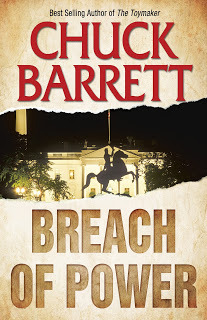
This Author Spotlightfeatures
Chuck Barrett
Bestselling authorof award-winning thrillersincluding Breach of Power
(Jake Pendleton series)
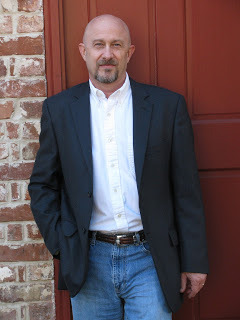
Chuck Barrett is the bestselling author of the Award-Winning Jake Pendleton series. Breach of Power —Winner of the 2013 Indie Excellence Award Political Thriller category and Finalist in the 2013 International Book Awards Thriller/Adventure category, The Toymaker—Finalist in the 2013 International Book Awards Thriller/Adventure & Mystery/Suspense categories, and The Savannah Project—Finalist in the 2011 International Book Awards Thriller/Adventure category, Second Place in the 2011 Reviewers Choice Awards Mystery/Thriller/Suspense/Horror category, and Honorable Mention in the 2011 ForeWord Reviews Book-Of-The-Year Awards Thriller/Suspense category.
Barrett is a Florida native and a graduate of Auburn University. He is a retired air traffic controller with over 26 years experience and veteran commercial pilot & flight instructor spanning over three decades of flight experience.
Chuck also holds Dive Master and Rescue Diver certifications. He enjoys hiking in the Rockies with his wife, Debi and currently resides in Northeast Florida.
1.How did you get into writing and why do you write?
I started writing in 1998 at the age of 41. I can't really explain why I started…I guess it's for the same reason I write….I felt like I needed to write or better yet—had to write. We all feel the need to express ourselves and writing is how I chose to do it.
2.What do you like best (or least) about writing?
Easy question—the best thing about writing is when the story takes off. Almost as if my fingers were telling the story. And so many times I'm bewildered afterwards as to how the story got there. But I love it. I reread it and wonder if I really wrote it. I've heard it said and I'm in total agreement…writing the story is the easy part. After the story is written, the real work begins!
3.What is your writing process? IE do you outline? Do you stick to a daily word or page count, write 7 days a week, etc?
Book one, The Savannah Project, I outlined meticulously and stuck mostly to the outline while writing the story. Book two, The Toymaker, I wrote from the cuff. All I knew when I started writing was where the story started and where it ended. Everything in between was written by the seat of my pants. But the story was a little disorganized and I had to do a lot of editing that I could have prevented with an outline. So for book three, Breach of Power , I combined them. I didn't outline or write freestyle, after roughly 50 pages or so, I plotted the story a few chapters ahead of my writing. Just short plot notes really, certainly not an outline. And that worked great for me.
Daily routines? What's that? I write when I'm in the mood or when the creativity seems to be flowing. I don't have a minimum or a maximum page/word count when I write. Usually though when I'm ready for a new story, I write in marathon sessions, completely tuning the world out. If I'm not writing, I'm working on the business side or reading. If I'm in the prose writing stage of a project and the creativity isn't there…or my words feel or sound stilted, I stop writing and read. Reading almost always gets the juices flowing again. It's not writer's block, just….oh, what's that word again?
4.Who are some other writers you read and admire, regardless of whether they are commercially “successful?”
I have my favorites that I always read, thriller writers of course: David Baldacci, Dan Brown (just finished Inferno), Lee Child, Vince Flynn, Brad Thor, Steve Berry, and the list goes on. I also read Meg Gardiner, Pan Callow, Richard C Hale, and a few others.
5.Should the question mark in the above question be inside or outside the quotes?
I was a poor English student in school but I'd have to say outside. But then again, I'm not sure I really care.
6.What’s your stance on the Oxford Comma?
A comma between the final items in a list, often preceding the word 'and' or 'or.' Of course, I had to go look it up online…thank you Dictionary.com.
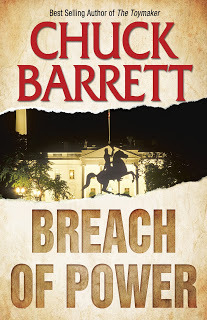 7.What is your book Breach of Power about and how did it come to fruition?
7.What is your book Breach of Power about and how did it come to fruition?Breach of Power is the 3rd in the Jake Pendleton series. It's the first book where my character, Jake, is a fully fleshed-out character possessing the skills he needs to carry the series. It is also a standalone story so there is no need to read the previous two in order to thoroughly enjoy Breach of Power. As a matter of fact, I've been recommending readers start with Breach of Power because I'm certain when they finish, they'll want to read the others.
Jake starts Breach of Power with those learned skills and uses them to track down a book lost in Germany during World War II. Along the way, he discovers others are searching for the book as well, but they're prepared to kill to get to it first.
The story came together from news clippings. A story about human remains found inside a glacier started the ball rolling. Another article about the mismarking of many graves in the Arlington National Cemetery allowed me to weave a story with lots of twists the reader will never see coming.
 8.What’s your current writing project?
8.What’s your current writing project?Just uploaded a non-fiction book about independent publishing geared toward helping authors make those difficult decisions about publishing and offering an option they might not have previously considered. The book is called Publishing Unchained: An Off-Beat Guide to Independent Publishing .
My fiction project is another thriller. It is the first book in a new series. The main character of the new series is an old character from a previous Jake Pendleton book.
9.What book(s) are you currently reading?
As I mentioned earlier, I just finished Dan Brown's newest and hottest Inferno. Tonight I'll start on David Baldacci's The Forgotten . I'll also be reviewing another author's manuscript—a paranormal thriller.
10.Who or what inspires your writing?
Credit where credit is due. I owe a lot to Steve Berry who was the first author to read my first manuscript. His inspiration has kept me motivated in writing, learning the craft, and focused on future writings.
Finally, is there anything you’d care to add? Please also include where people can read your published stories, buy your book, etc.
I'm not sure where I heard or read it first, but a few words I think every writer should pay attention to:
Read more than you write, listen more than you talk.
My books are available in most formats…not audio books yet. And, of course, Amazon has them all. The best bet for readers is to go to my website, http://chuckbarrettbooks.com and take a look. On the individual book pages on my website are links to the direct pages to buy that book, ie, 'Kindle' link for Amazon Kindle page for that book. Nook, Kobo, print…you get the picture. There are also links to my Twitter, Facebook, and YouTube pages.
Thank you, Chuck. Breach of Power looks fantastic, as do all your books. Thank you for the words of wisdom, too. Great and sound advice.
Be sure to visit Chuck's website and follow him on Twitter to stay up to date on his latest book news.
You can also grab a Kindle/Print copy of his books at the Amazon links below:
Published on July 02, 2013 08:48



